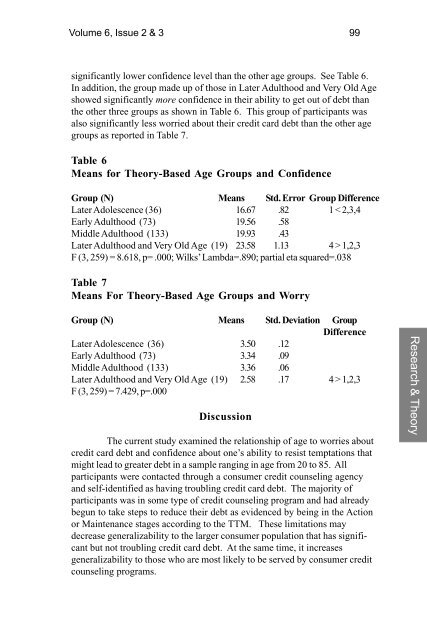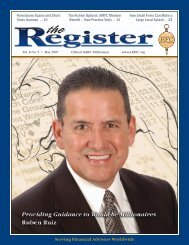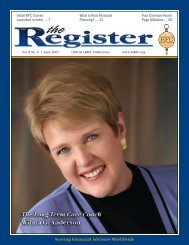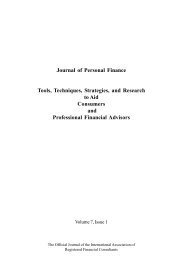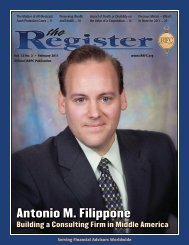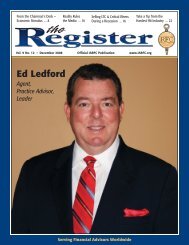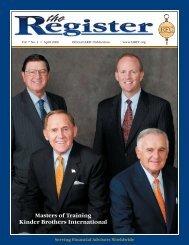3433-vol. 6 issue 2-3.pmd - iarfc
3433-vol. 6 issue 2-3.pmd - iarfc
3433-vol. 6 issue 2-3.pmd - iarfc
You also want an ePaper? Increase the reach of your titles
YUMPU automatically turns print PDFs into web optimized ePapers that Google loves.
Volume 6, Issue 2 & 3 99<br />
significantly lower confidence level than the other age groups. See Table 6.<br />
In addition, the group made up of those in Later Adulthood and Very Old Age<br />
showed significantly more confidence in their ability to get out of debt than<br />
the other three groups as shown in Table 6. This group of participants was<br />
also significantly less worried about their credit card debt than the other age<br />
groups as reported in Table 7.<br />
Table 6<br />
Means for Theory-Based Age Groups and Confidence<br />
Group (N) Means Std. Error Group Difference<br />
Later Adolescence (36) 16.67 .82 1 < 2,3,4<br />
Early Adulthood (73) 19.56 .58<br />
Middle Adulthood (133) 19.93 .43<br />
Later Adulthood and Very Old Age (19) 23.58 1.13 4 > 1,2,3<br />
F (3, 259) = 8.618, p= .000; Wilks’ Lambda=.890; partial eta squared=.038<br />
Table 7<br />
Means For Theory-Based Age Groups and Worry<br />
Group (N) Means Std. Deviation Group<br />
Difference<br />
Later Adolescence (36) 3.50 .12<br />
Early Adulthood (73) 3.34 .09<br />
Middle Adulthood (133) 3.36 .06<br />
Later Adulthood and Very Old Age (19) 2.58 .17 4 > 1,2,3<br />
F (3, 259) = 7.429, p=.000<br />
Discussion<br />
The current study examined the relationship of age to worries about<br />
credit card debt and confidence about one’s ability to resist temptations that<br />
might lead to greater debt in a sample ranging in age from 20 to 85. All<br />
participants were contacted through a consumer credit counseling agency<br />
and self-identified as having troubling credit card debt. The majority of<br />
participants was in some type of credit counseling program and had already<br />
begun to take steps to reduce their debt as evidenced by being in the Action<br />
or Maintenance stages according to the TTM. These limitations may<br />
decrease generalizability to the larger consumer population that has significant<br />
but not troubling credit card debt. At the same time, it increases<br />
generalizability to those who are most likely to be served by consumer credit<br />
counseling programs.<br />
Research & Theory


